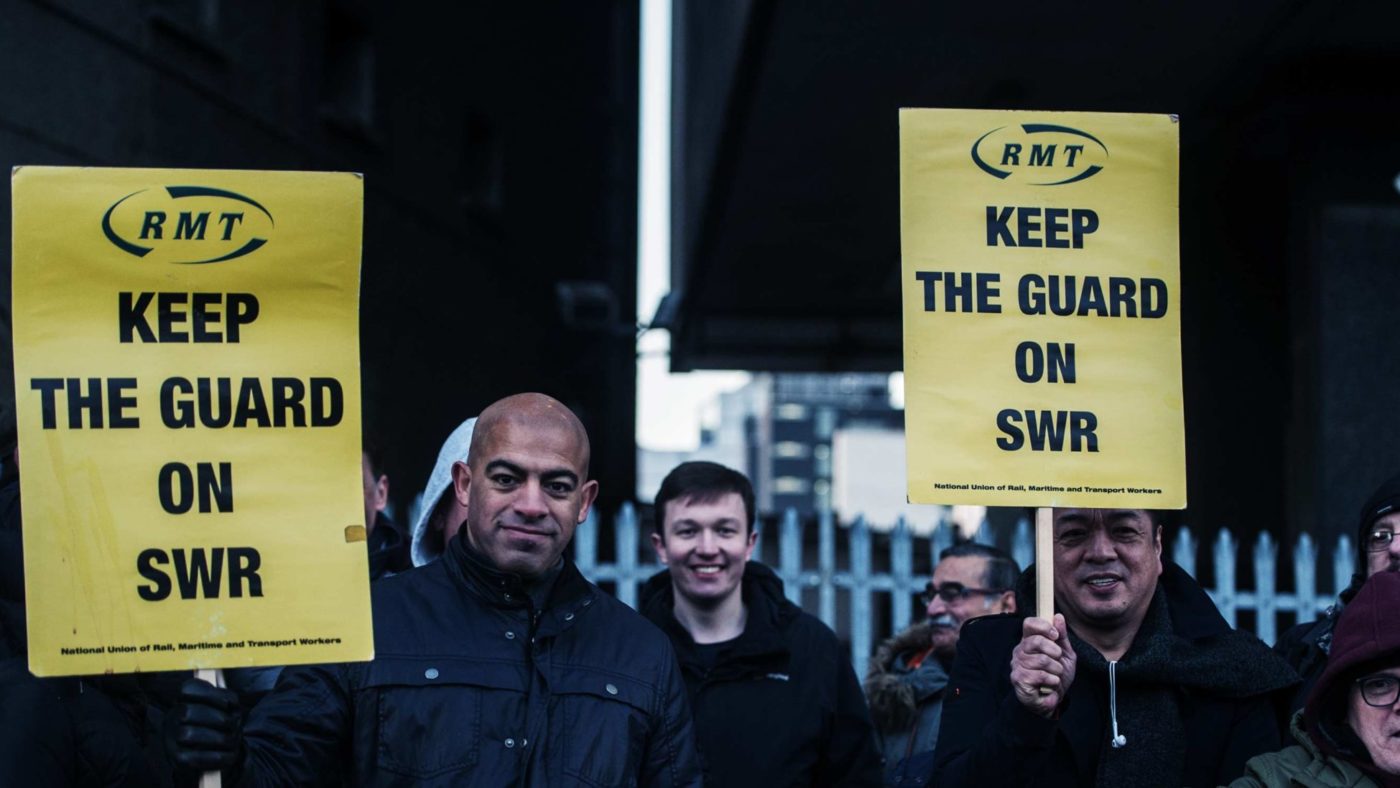The year is almost over and once again the Rail, Maritime and Transport Workers Union (RMT) are holding the government to ransom.
They are taking industrial action on South Western Trains, striking for 27 days throughout December, citing the need for a guard to be placed on their trains for safety reasons. SWT have acquiesced to the union’s demands and kept the guard on the train. Yet still, the RMT are complaining: this time that the guards won’t be in control of the doors. So the month-long strike is still going ahead.
When it comes to taking industrial action, unions invariably seem to focus on safety. As RMT General Secretary Mick Cash claims “80% of these incidents have involved services being operated in Driver Only Operation (DOO) without a second on-board safety critical worker, a guard or train manager”.
As the safety watchdog, the Rail Safety and Standards Board (RSSB) have made clear, there is no extra risk to passengers from driver only operated services. Over 15 years, the RSSB conducted extensive research and concluded there was no increased risk with DOO. adding “Our conclusions from the latest analysis are that there is no discernible difference in the risk associated with driver-only dispatch vs driver and guard dispatch.” In fact, they also concluded that in some areas DOOs are actually safer, as the potential for miscommunication between the guard and the driver is eliminated.
British Rail first introduced DOO services on the Bedford to St. Pancras line in 1982 with no increase in accidents. Now 30% of the UK mainline network – including London Underground – uses DOO. It is plainly ridiculous for Mr Cash to claim they are unsafe.
As well as making travellers’ lives a misery, the financial impact of the month-long strike is immense. That ballots cast by just 796 people have been allowed to cause a loss to business estimated by brokerage Panmure Gordon at £400 million is appalling.
The RMT will bear none of the financial consequences from this strike. Current law provides complete protection for both the worker and the union from civil action brought forth against them for economic compensation. A strike is a breach of contract and as such can technically lead to a person being sued. Yet you can’t sue strikers or their union due to the Trade Disputes Act of 1906.
Rail privatisation was supposed to transfer the risk away from the taxpayer, yet we foot the bill when strikes win and the government shells out huge amounts for the inflated salaries demanded by its strikers. According to Glassdoor, the average South Western train driver salary is £54,468 and a guard’s salary is estimated at £27,475. That seems particularly unfair given that policemen, who are not allowed to strike, have a starting salary ranging between £19,971 and £23,124.
Of course, there is scant prospect of reform if Jeremy Corbyn manages to form a government after next week’s general election. After all, his right-hand man John McDonnell has publicly declared that the RMT should have a “major say” in transport policy.
Too often, unions are hostile to technology and innovation. Look at the cheers of delight from Unite, (which represents London’s black cab taxi-drivers) when Transport for London revoked Uber’s licence to operate in London – again, ostensibly on the grounds of safety. Unions can’t understand competition, so they blame Uber for ‘predatory pricing’ when in reality Uber’s prices are responsive to the market forces of supply and demand, and their service is infinitely more convenient than trying to hail an expensive Hackney Carriage.
The best way to both save money and reduce the baleful influence of groups like the RMT is to invest in new technology that allows for the removal of guards and eventually the complete removal of drivers too. This is not a pipe dream. Indeed, the Japanese city of Kobe has had a driverless line since as far back as 1981. Four years later Vancouver’s automated Expo line opened. There are now sixty-three fully automated operation lines in 19 countries worldwide. To assuage any safety fears from commuters, companies could invest in state of the art CCTV.
Thanks to the Trades Dispute Act, the unions effectively have great power with little accountability. The way groups like the RMT can massively inconvenience the travelling public, yet face no recourse for the economic losses incurred needs to be addressed.
If we want change, the next government needs to take firm action. Lowering fares through innovative technology, enhanced competition and increased productivity, while reforming the Trade Disputes Act to end the menace of endless strikes for long-suffering commuters.
Click here to subscribe to our daily briefing – the best pieces from CapX and across the web.
CapX depends on the generosity of its readers. If you value what we do, please consider making a donation.


